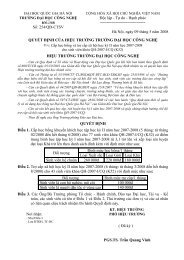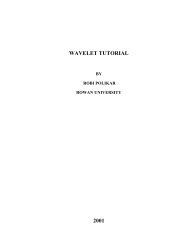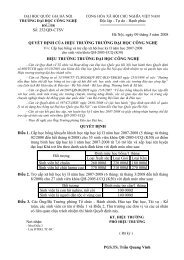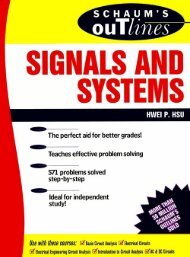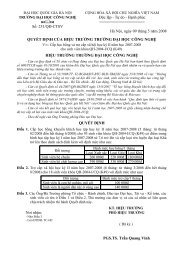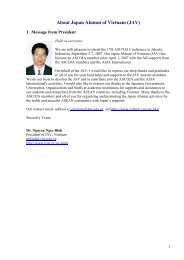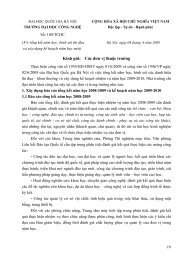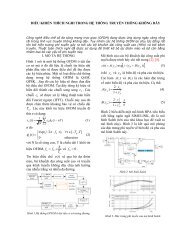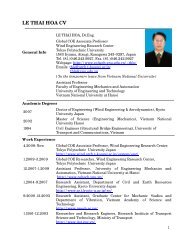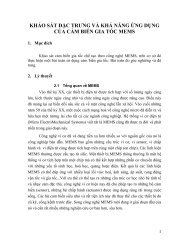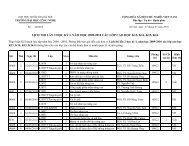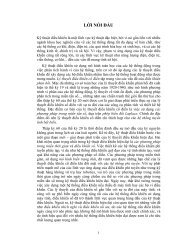Discussion: How to write a research paper?
Discussion: How to write a research paper?
Discussion: How to write a research paper?
Create successful ePaper yourself
Turn your PDF publications into a flip-book with our unique Google optimized e-Paper software.
<strong>Discussion</strong>: <strong>How</strong> <strong>to</strong> <strong>write</strong> a<br />
<strong>research</strong> <strong>paper</strong><br />
Nguyen Van Du – duk48d@gmail.com<br />
Department of Information Processing<br />
Website for seminar resources:<br />
www.coltech.vnu.edu.vn/~tantd
Contents<br />
• Research <strong>paper</strong><br />
• The writing problem<br />
• Writing progress<br />
• Structure<br />
• Some tips.<br />
• Conclusion
Why we have <strong>to</strong> <strong>write</strong> a<br />
<strong>research</strong> <strong>paper</strong><br />
• For publication: gain recognition, get<br />
promoted.<br />
• Sharing idea, contribute for community.<br />
• Durable document, help improving later work.<br />
• Convey your idea (your head <strong>to</strong> reader’s<br />
head)<br />
• “The greatest ideas are worthless (literally) if<br />
you keep them <strong>to</strong> yourself”
Writing problem<br />
• Poor English skills<br />
• Lack of proper training<br />
• Lack of method
Is writing <strong>paper</strong> boring<br />
• “Writing is easy. All you do is stare at a<br />
blank sheet of <strong>paper</strong> until drops of<br />
blood form on your forehead” --- Gene<br />
Fowler<br />
• But It’s my big challenge now.
Writing progress<br />
• “Writing <strong>paper</strong> is how <strong>to</strong> develop the<br />
idea in the first place”
Writing steps<br />
• Writing the complete first draft of your <strong>paper</strong>,<br />
except for the Introduction and Conclusion<br />
• Present the big picture, then <strong>to</strong>wards the details.<br />
• Make sure the ideas are in the right order “Can<br />
the reader understand every passage strictly from<br />
the material up <strong>to</strong> that point”<br />
• Transitions between ideas.<br />
• Write the Conclusion<br />
• Write the Introduction
Conveying the idea<br />
It’s It’s interesting<br />
problem.<br />
• Introduce the problem It’s an<br />
interesting problem<br />
• It’s an unsolved problem<br />
• Here is my idea<br />
• My idea works (details, data)<br />
• Compares <strong>to</strong> other people’s<br />
approaches.<br />
I I need need it. it.
Structure<br />
• Abstract.<br />
• I. Introduction<br />
• II. Formulation of the Problem<br />
• III. Results<br />
• IV. Conclusions
Abstract<br />
• Very important (reader read it first <strong>to</strong><br />
decide which <strong>paper</strong> <strong>to</strong> read; submitting<br />
<strong>paper</strong>..)<br />
• Structure (about 4 sentences)<br />
• State the problem<br />
• Say why it’s an interesting problem.<br />
• Say what your solution achieves<br />
• Say what follows from your solution
I. Introduction<br />
• Open up <strong>to</strong> subject<br />
• Survey past work relevant<br />
• Describe the assumptions<br />
• Overview of contents (section I, II, …)
II. Formulation of the problem<br />
• Define the problem<br />
• Define all terminology and notation<br />
• Develop the equation The result will<br />
be based.
III. Results<br />
• Presents the detailed results.<br />
• Clear what point convey <strong>to</strong> the<br />
reader.<br />
• Contribution of the results
IV. Conclusion<br />
• Summarize (what has been done) in the<br />
<strong>paper</strong>.<br />
• Conclusion (and Introduction) are<br />
important <strong>to</strong> the reader (many of reader<br />
will read Introduction & Conclusion<br />
first).
Giving credit<br />
• “Giving credit <strong>to</strong> others does not diminish the<br />
credit you get from your <strong>paper</strong>”<br />
• “Credit Is not like money”<br />
• If you imply that an idea is yours, and the<br />
referee knows it is not, then either<br />
• You don’t know that it’s an old idea (bad)<br />
• You do know, but are pretending it’s yours (very<br />
bad)
Some tips<br />
• 1. Get rid of as many passive verbs as<br />
possible<br />
• 2. Use verbs more than nouns<br />
• 3. Get rid of as many abstract words as<br />
possible.<br />
• 4. Check for consistent use of verb tense<br />
• 5. Get your <strong>paper</strong> read by as many friends as<br />
possible.
Conclusions<br />
• Beginner need methods and tips<br />
• Structure<br />
• Avoiding mistakes.<br />
• General requirements.<br />
• It’s better if we<br />
• follow the rules<br />
• Practice more<br />
• Start writing <strong>paper</strong> early.<br />
• There are many sources for learning writing.
Proposal<br />
• Create the sources for younger <strong>write</strong>r<br />
(books, tips, links…)<br />
• Internet folder.<br />
• Seminar, discussion.<br />
• Encourage the helping, giving talk from<br />
prominent <strong>research</strong>ers – the very good<br />
<strong>write</strong>rs.
References<br />
• <strong>How</strong> <strong>to</strong> <strong>write</strong> a great <strong>research</strong> <strong>paper</strong> –<br />
S.P. Jones<br />
• Fourteen Steps <strong>to</strong> a Clearly Written<br />
Technical Paper – R.T. Comp<strong>to</strong>n<br />
• Some hints <strong>to</strong> Improve Writing of<br />
Technical Papers – P. Valduriez .et al<br />
• Element of Style - William
Thanks for your attention!



